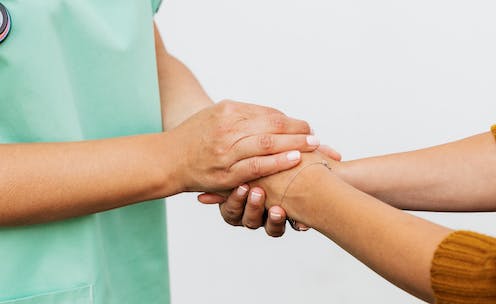
As a philosophy professor and researcher of end-of-life ethics, I ask the students in my ethics class who should be eligible to receive Medical Assistance in Dying (MAID). Should it be open only to people actively dying from a terminal illness? To anyone with any medical condition that causes them unendurable suffering? To anyone who asks for it for any reason, as long as their request is truly voluntary?
Student responses generally align with the original 2016 MAID legislation, which required that the patient’s death be reasonably foreseeable and that they have a grievous and irremediable illness causing enduring and intolerable suffering.
Since 2016, Canada’s practice of offering MAID has followed a trajectory of ever-expanding eligibility. As of March 17, 2021, to receive MAID a person no longer has to be dying anytime soon.
If their death is reasonably foreseeable, they no longer need to undergo the 10-day reflection period to ensure that this is really what they want. Nor do they have to give final consent to the procedure immediately before it is administered, which allows for individuals who lose the ability to consent to have their lives ended despite that.
Although the federal government has put implementation on hold after concerns were raised, the 2021 legislation also opens MAID for persons who do not have a physical illness; a grievous and irremediable mental illness will also make one eligible.
Eligibility and expansion

THE CANADIAN PRESS/Adrian Wyld
What eligibility criteria remain? A person must be at least 18 years of age. This condition has been and continues to be challenged, with alternative minimum ages as low as 12 being suggested. Requests for MAID must also be voluntary, though it is often possible to question how voluntary MAID requests are when people don’t understand or have access to good palliative care and social supports.
Read more:
Why is access to medically assisted death a legislated right, but access to palliative care isn’t?
The issue of whether MAID is voluntary can also conflict with requests for MAID by advance directive, when a person’s condition has made it impossible for them to give final consent. This was illustrated when a Dutch physician used a sedative to pacify a woman with dementia who had previously requested assisted death.
The ultimate expansion of eligibility would make MAID available to anyone who wanted it, for any reason. This might seem absurd, but it follows the sort of logic articulated by Senator Stan Kutcher before the vote on Bill C-7 to expand MAID to cases of suffering from mental illness:
“Intolerable suffering is a subjective personal experience. It cannot be negated or delegitimized by anyone else’s valuation of that suffering.”
If a person’s claim to intolerable and enduring suffering must always be accepted at face value, why limit MAID eligibility to physical or mental illnesses? Many things besides illness cause suffering: the break-up of a personal relationship, loss of a job, low self-esteem, boredom, loneliness, a sense of meaninglessness.
If it’s discriminatory to discount suffering from mental illness, how can we avoid discriminating if we refuse to put suffering from other forms of hardship on an equal par? Indeed, it seemed to make good sense to at least one doctor recently to approve the application of a man whose MAID request was based not on his chronic pain issues but on his risk of becoming homeless.
In the Netherlands, a bill has been in the works for some time to provide access to physician-assisted death for anyone over the age of 75 who feels that their life is “complete,” even if they have no physical or mental illness.
Ethical implications and questions
Part of the reason it made sense to allow MAID for people already actively dying was that doing so seemed equivalent to accepted practices such as withdrawing life-sustaining treatment or palliative sedation.
This equivalence fails when we broaden the scope of MAID to those who aren’t dying, and all the more when we countenance offering it for non-terminal mental illness, or loneliness, or loss of ability to engage in meaningful activities.
Given how quickly things have changed in Canada over the past six years, and the further expansions in other jurisdictions who’ve had MAID longer than we have, it is time we took a step back to ask whether current MAID practice is still something we want to support.
Those who raised slippery slope concerns in the past might reasonably claim we’ve slid halfway down the slope already. How do we put the brakes on to make sure we don’t slip any further? What kind of a society are we if we sanction doctors to end the lives of suffering people while not doing our best to ensure they have the support that would make their lives worth living?
Maybe, tragically, death was the best we could offer for those initially eligible for MAID. But the broader the category of MAID-eligible individuals becomes, the more empty this sort of reasoning feels.
![]()
Andrew Stumpf receives funding from Social Sciences and Humanities Research Council of Canada.
























